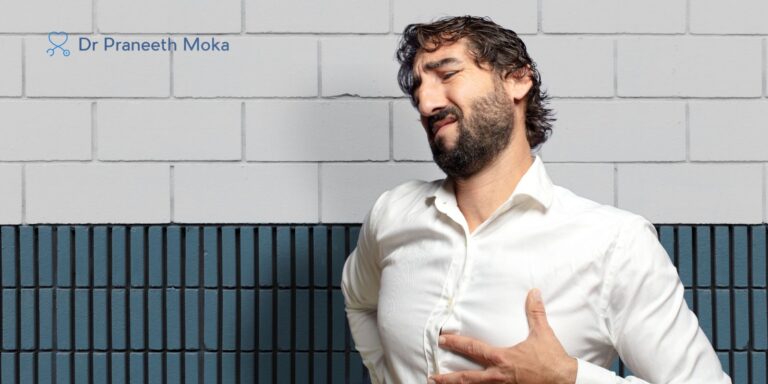Book Appointment Now

7 Reasons ERCP Is Recommended for Bile Duct Problems by a Gastro Expert
Best gastroenterologist in Hyderabad Dr. Moka Praneeth emphasizes that understanding the role of the biliary tract is crucial for maintaining overall digestive health. The human digestive system is a remarkably complex network of organs that perform essential functions—digesting food, absorbing nutrients, and eliminating waste. Yet, one part of this system that often goes unnoticed is the biliary tract—a critical set of channels that includes the bile ducts, gallbladder, and associated structures.
The biliary tract is responsible for transporting bile, a digestive fluid produced by the liver, to the small intestine. Bile is essential for breaking down dietary fats and assisting in the absorption of fat-soluble vitamins (A, D, E, and K). It also helps flush out toxins, cholesterol, and waste products from the body. This makes the biliary tract not just a passageway, but a key player in digestive efficiency and metabolic health.
When the bile ducts become narrowed, blocked, or inflamed—due to conditions such as gallstones, strictures, infections, or even tumors—it disrupts the entire digestive process. Patients may experience symptoms like jaundice (yellowing of the skin and eyes), abdominal pain, fever, nausea, and dark urine. Left untreated, these issues can escalate to life-threatening complications, including cholangitis (bile duct infection) or biliary cirrhosis.
As the best gastroenterologist in Hyderabad, Dr. Moka Praneeth frequently encounters patients who are unaware of how vital a healthy biliary system is. Early intervention, timely diagnosis, and advanced endoscopic procedures like ERCP (Endoscopic Retrograde Cholangiopancreatography) are often required to diagnose and treat bile duct disorders effectively. A well-functioning biliary tract ensures not only smoother digestion but also reduces the risk of chronic liver disease and related complications.
Understanding and protecting the biliary system isn’t just for medical specialists—it’s essential knowledge for anyone who values their digestive health.
Understanding the Role of the Bile Ducts
Before diving into the reasons for ERCP, it’s important to understand what the bile ducts do. These ducts are part of the biliary system, which includes:
- Intrahepatic bile ducts (inside the liver)
- Extrahepatic bile ducts (outside the liver)
- Common bile duct (joins the liver and gallbladder to the small intestine)
Any obstruction, narrowing, or inflammation in these ducts can hinder the flow of bile, leading to symptoms like:
- Jaundice (yellowing of the skin and eyes)
- Severe abdominal pain
- Nausea and vomiting
- Dark urine and pale stools
- Itching
- Fever and chills (when infection is present)
Dr. Moka Praneeth, a trusted gastroenterologist in Hyderabad, emphasizes that early diagnosis and timely treatment are critical for managing bile duct disorders. ERCP is often the best solution in these situations.
Reason 1: ERCP Helps Diagnose Bile Duct Obstruction
One of the most common reasons to perform ERCP is to identify obstruction in the bile ducts. Blockages can occur due to:
- Gallstones
- Tumors (benign or malignant)
- Inflammation (cholangitis or pancreatitis)
- Post-surgical complications (e.g., bile leaks)
ERCP combines endoscopy with fluoroscopic imaging to give the doctor a detailed view of the bile and pancreatic ducts. It not only reveals the location of the blockage but also its likely cause. This dual capability makes ERCP both a diagnostic and therapeutic procedure.
Dr. Moka Praneeth, a renowned Liver Specialist in Hyderabad, notes that ERCP is often the first step in determining the course of treatment when imaging tests like ultrasound or MRCP are inconclusive.These bile duct problems can occur due to several underlying causes:
- Gallstones: These are hardened deposits of digestive fluid that can form in the gallbladder and may migrate into the bile ducts, causing blockages and inflammation. This is one of the most common reasons for ERCP.
- Tumors (benign or malignant): Growths within or around the bile ducts or pancreas—whether non-cancerous or cancerous—can compress or obstruct the ducts, leading to jaundice, weight loss, or abdominal pain.
- Inflammation (cholangitis or pancreatitis): Infections or inflammation in the bile ducts (cholangitis) or pancreas (pancreatitis) can lead to narrowing or strictures of the ducts, which may require drainage or stenting through ERCP.
- Post-surgical complications: After procedures like gallbladder removal (cholecystectomy) or liver surgeries, patients can develop bile leaks, strictures, or injuries to the bile ducts that need urgent attention and repair.
To evaluate and treat these conditions, ERCP (Endoscopic Retrograde Cholangiopancreatography) serves as a highly specialized and effective tool. This technique combines an upper GI endoscopy (a thin, flexible camera inserted through the mouth) with fluoroscopic imaging (a special type of real-time X-ray). Together, these tools allow doctors to not only visualize the bile and pancreatic ducts in great detail but also to perform interventions such as:
- Removing bile duct stones
- Inserting stents to relieve blockages
- Dilating narrowed ducts (strictures)
- Sealing bile leaks
- Taking tissue biopsies for further analysis
Because of this dual diagnostic and therapeutic capability, ERCP is considered a cornerstone in the management of complex biliary and pancreatic disorders.
Dr. Moka Praneeth, a renowned Liver Specialist in Hyderabad and widely regarded as the best gastroenterologist in Hyderabad, highlights that ERCP is often the first line of action when non-invasive imaging tests like ultrasound or MRCP (Magnetic Resonance Cholangiopancreatography) are inconclusive or unable to provide a clear diagnosis. In such cases, ERCP not only helps confirm the exact nature and location of the issue but also enables immediate treatment—saving patients from additional procedures or delays.
For patients experiencing unexplained jaundice, persistent abdominal pain, or suspected bile duct injuries, ERCP can be a life-saving and organ-preserving intervention. Dr. Moka Praneeth stresses that timely referral to a specialist who is trained in advanced endoscopic techniques is essential for ensuring the best outcomes.
Reason 2: ERCP Can Remove Gallstones from the Bile Duct
While many people are aware of gallstones in the gallbladder, fewer realize that these stones can migrate into the common bile duct, causing a dangerous condition called choledocholithiasis. This can lead to intense abdominal pain, jaundice, and serious infections such as cholangitis.
ERCP is the most effective non-surgical method to remove stones from the bile duct. Using small tools passed through the endoscope, the doctor can:
- Widen the bile duct (sphincterotomy)
- Retrieve stones with a basket or balloon
- Place stents if necessary
This can provide immediate relief and eliminate the need for open surgery. As the gastroenterologist in Hyderabad in Hyderabad, Dr. Moka Praneeth has performed hundreds of ERCPs to safely and effectively remove gallstones, often allowing patients to recover within 24–48 hours.
Reason 3: ERCP Treats Bile Duct Strictures and Narrowing
A stricture is an abnormal narrowing of the bile duct. It can be caused by:
- Chronic inflammation
- Injury from gallbladder surgery
- Tumors or cancers
- Autoimmune conditions (like primary sclerosing cholangitis)
Left untreated, strictures can lead to long-term liver damage. ERCP allows for the placement of biliary stents to widen the duct and restore normal bile flow.
According to Dr. Moka Praneeth, a gastroenterologist in Hyderabad, stent placement via ERCP is one of the most efficient ways to manage strictures without resorting to major surgery.
Reason 4: ERCP Detects and Treats Bile Leaks After Surgery
Bile duct injuries can occur during surgeries such as cholecystectomy (gallbladder removal) or liver transplants. If not managed quickly, they can cause bile to leak into the abdominal cavity, leading to infection, severe pain, and even sepsis.
ERCP helps by:
- Visualizing the site of the leak
- Placing a stent to divert bile away from the leak
- Promoting natural healing of the duct
Dr. Moka Praneeth, recognized as the best gastroenterologist in Hyderabad, highlights that early use of ERCP can often prevent a second surgery in post-operative bile leak cases.
Reason 5: ERCP Is Essential in Diagnosing and Staging Bile Duct Cancer
Cholangiocarcinoma (bile duct cancer) and other cancers that affect the pancreas or liver often cause blockage in the bile ducts. ERCP can play a crucial role in:
- Visualizing tumors
- Collecting tissue samples via brush biopsy
- Placing stents to relieve obstruction
This helps in staging the cancer and guiding treatment plans. While not a curative tool for cancer, ERCP can significantly improve quality of life by relieving symptoms like jaundice and itching.
As a Liver Specialist in Hyderabad, Dr. Moka Praneeth collaborates with oncologists to use ERCP as part of a multi-disciplinary approach to managing gastrointestinal cancers.
Reason 6: ERCP Manages Pancreatic Duct Problems Too
Though ERCP is often associated with the bile ducts, it is equally valuable in diagnosing and treating pancreatic duct disorders, such as:
- Chronic pancreatitis
- Pancreatic duct stones
- Ductal strictures
- Pancreatic cancer
ERCP can relieve pain and inflammation by draining blocked ducts, removing stones, and taking biopsies from suspicious areas. For patients with persistent abdominal pain and elevated pancreatic enzymes, ERCP offers clarity and relief.
Dr. Moka Praneeth, often hailed as the gastroenterologist in Hyderabad, uses ERCP regularly to address complex pancreatic conditions, improving patient outcomes significantly.
Reason 7: ERCP Is Minimally Invasive with Faster Recovery
Unlike open or laparoscopic surgery, ERCP is performed using a thin, flexible tube inserted through the mouth into the digestive tract. This means:
- No surgical incisions
- Shorter hospital stays
- Faster return to normal activities
- Lower complication rates
While ERCP is not without risks, in the hands of a skilled gastroenterologist, it is a safe and effective tool. Dr. Moka Praneeth, widely regarded as a trusted gastroenterologist in Hyderabad, ensures that patients undergo ERCP only when clearly indicated, and with full pre- and post-procedure care.
Who Should Consider ERCP?
You may be a candidate for ERCP if you experience any of the following warning signs that point to issues within the bile or pancreatic ducts:
- Persistent or recurring jaundice: Yellowing of the skin and eyes may indicate a blockage in the bile ducts, often caused by stones, tumors, or inflammation.
- Severe abdominal pain (especially in the upper right): This pain may result from gallstones, bile duct inflammation, or pancreatitis—all of which require urgent evaluation.
- Unexplained weight loss: When your body cannot properly absorb nutrients due to a bile duct or pancreatic problem, sudden weight loss may occur.
- Abnormal liver function tests: Elevated liver enzymes, particularly bilirubin and alkaline phosphatase, often reflect impaired bile flow or liver stress.
- History of gallstones or bile duct surgery: Previous gallbladder issues or surgeries involving the bile ducts increase your risk of complications like strictures or bile leaks.
If any of these symptoms sound familiar, it is crucial to consult a Gastroenterologist in Hyderabad without delay. Early diagnosis and timely intervention can prevent serious outcomes such as bile duct infections, liver damage, or cancer.
A well-trained Gastroenterologist in Hyderabad will assess your condition thoroughly, often beginning with imaging tests like ultrasound or MRCP. If those results are inconclusive, ERCP may be the next logical step, offering both diagnostic precision and immediate treatment.
Remember, your health shouldn’t wait. Speaking with an experienced Gastroenterologist in Hyderabad ensures you receive the right care at the right time—potentially saving you from avoidable complications and improving long-term outcomes.
Meet Dr. Moka Praneeth: Your Expert in ERCP and Digestive Health
With extensive training and experience in therapeutic endoscopy and hepatobiliary disorders, Dr. Moka Praneeth is one of the best gastroenterologists in Hyderabad. He specializes in:
- Advanced ERCP and endoscopic ultrasound (EUS)
- Management of biliary and pancreatic diseases
- Liver disease care and cirrhosis management
- Complex GI cancer diagnosis and staging
Patients value his accuracy, compassion, and results-driven approach. As a trusted gastroenterologist in Hyderabad, Dr. Moka Praneeth combines cutting-edge technology with personalized care to achieve the best possible outcomes.
Final Thoughts: Don’t Ignore Bile Duct Symptoms
Bile duct disorders are often silent in the early stages but can lead to severe consequences if left untreated. ERCP offers a powerful, minimally invasive way to both diagnose and treat these conditions efficiently.
Whether it’s gallstones, strictures, bile leaks, or tumors—ERCP in expert hands makes all the difference.
And when it comes to expertise, Dr. Moka Praneeth, the best gastroenterologist in Hyderabad, is trusted by patients and peers alike for his skill, judgment, and dedication.
Book Your Consultation Today
If you’re experiencing symptoms like jaundice, pain, or abnormal liver tests, don’t wait.
👉 To Book appointment – https://drpraneethmoka.com/contact/
Call Us For Appointment: +91 70753 52525
Write a Message: info@drpraneethmoka.com |
Follow us on: praneethgastrocentre




